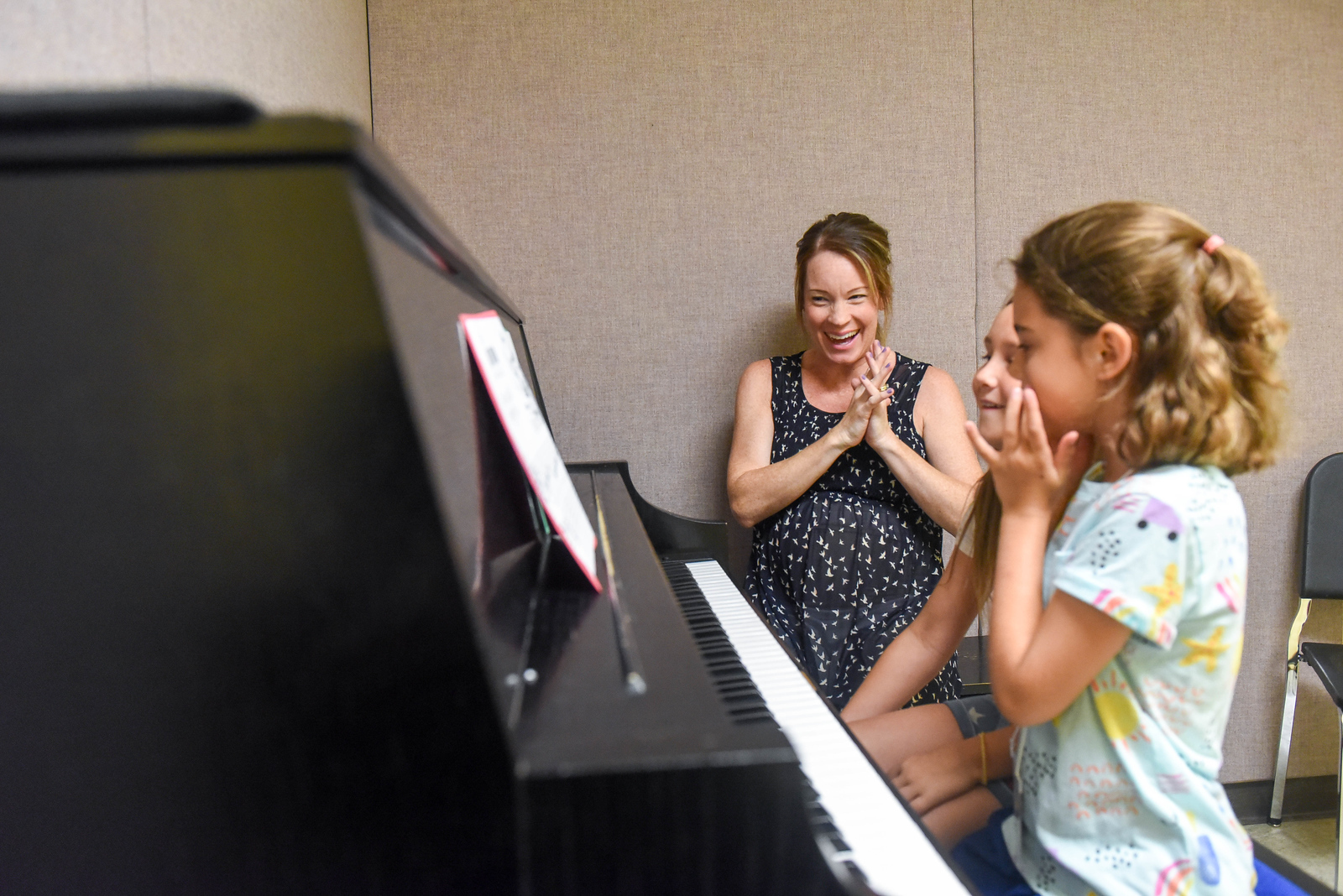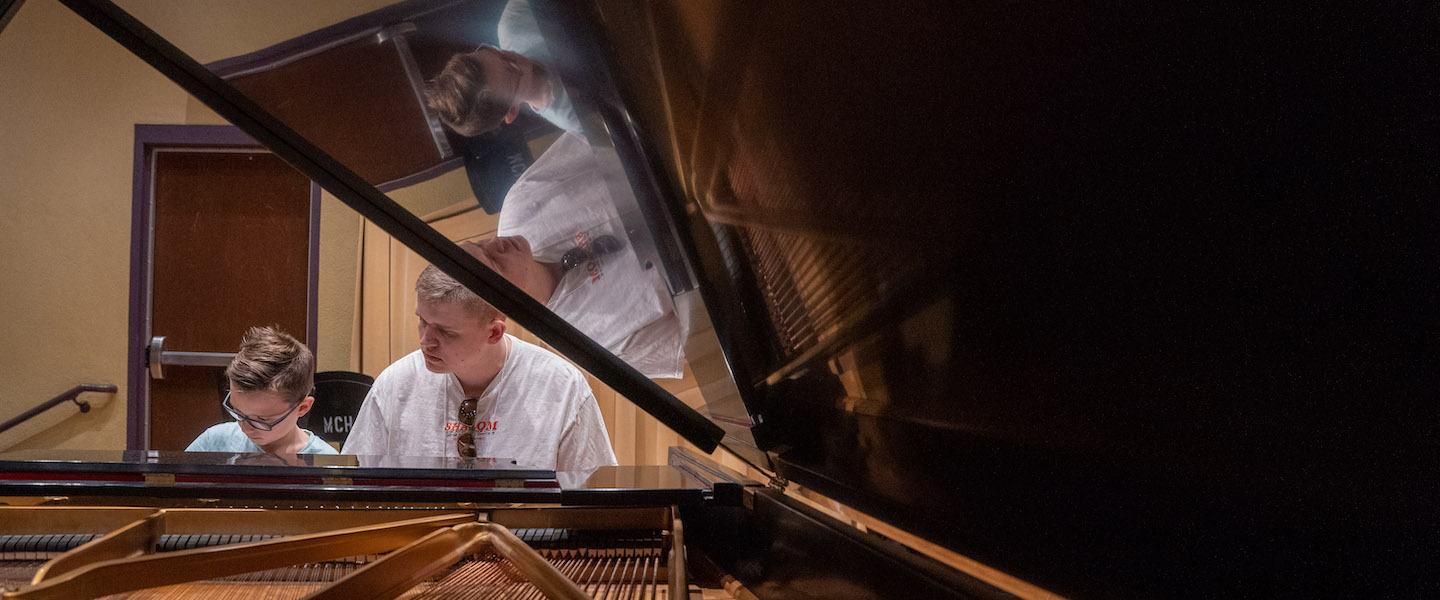Why study Music Teaching?
The Master of Music in Music Teaching is specifically designed for students to gain their teaching licensure credential, with the option to choose between vocal or instrumental licensure.
In addition to courses in the area of specialization, coursework also is required in music education foundations, contemporary educational issues, diverse learners and educational psychology. Supporting courses in music include research, theory, history, ensemble participation and applied studies.
Music Teaching majors are required to successfully complete written and oral comprehensive examinations. In fulfillment of teaching licensure requirements, the culminating project will be the EdTPA Portfolio, completed during the Student Teaching semester.
What You'll Learn
- Conducting music research, encompassing both quantitative and qualitative research.
- Music History, covering a wide range of periods, composers and genres.
- Music analysis across a range of genres and styles.
- Learning theories, classroom management and discipline, testing and evaluation.
- An overview of the historical, philosophical and psychological foundations of music education.
- How to be conversant with and knowledgeable about current education topics, issues and trends which impact music education.
- Private applied study on instrument or voice.
Program Information
Curriculum
The Master of Music Teaching degree requires 45 hours of coursework. It is formatted to be completed in two years.
- Music Core: 13 hours
- Education Core: 6 hours
- Music Education Core: 10 hours
- Certification/Licensure Area: 10 hours
- Student Teaching: 6 hours
Courses You'll Take
- MUS 5010 Introduction to Music Research: Introduction to music research tools, materials and techniques. The focus of the course will include major references and indexes, database and internet research. The course will be relevant to all majors and will encompass both quantitative and qualitative research. A research project relating to the student’s major will be required.
- MUH 5210 Music History Seminar: Prerequisites: MUG 5010 or passing score on Graduate History Placement Exam.
A series of in-depth topical seminars for graduate music students which will cover a wide range of periods, composers and musical genres.
- MUT 5310 Analytical TechniquesPrerequisites: MUG 5020 or passing score on Graduate Theory Placement Exam.
Advanced study in the analysis of music from across a range of genres and styles. In addition to traditional harmonic and formal analysis, a variety of techniques will be explored and may include LaRue style analysis; analysis of rhythm and meter; and an introduction to Schenkerian and related linear-reductive systems.
- MPA 51xx Private Applied Study - 2 Hours (2 semesters, 1 hour each)
Private Applied Study on instrument or voice
- MUN 5980 Music Ensemble Studies - 2 Hours (2 semesters, 1 hour each)
Ensemble Participation in an instrumental or vocal ensemble
- EDU 5110 Advanced Educational Psychology
This course addresses those issues which arise in the development of children and youth in the context of education. It includes learning theories, human growth and development, motivation, classroom management and discipline, testing and evaluation. The course has a practicum component.
- EDU 5800 Introduction to Exceptional Learners
Overview of exceptionalities; introduction to pedagogical, curricular and social considerations involved in educating diverse learners in the classroom. Expansion of pedagogical overview to include research and dissemination focused on the identification and implementation of evidenced-based practices. The course has a practicum component. .)
- MUE 5210 Foundations of Music Education
Foundations of Music Education provides an overview of the historical, philosophical and psychological foundations of Music Education. Course content explores curricular design reflecting these diverse components of the field of Music Education.
- MUE 5220 Methods and Materials in Elementary/Middle School Music
This course provides an overview of major contemporary systems of elementary/middle school music teaching. Philosophical/historical background, exemplary techniques and resource materials are presented to clarify these methodologies as optional approaches for teaching music to children.
- MUE 5250 Contemporary Issues in Music Education
The course will prepare music educators to be conversant with and knowledgeable about current education topics, issues and trends which impact music education. Students will engage in current issues of curriculum and investigate sources for curriculum models; study the major landmarks, trends and tools in music education assessment and accountability; consider legal and political issues related to education and function as a community of leaders as they examine these and other topics related to general education as well as to music education.
1. Apply to the University
- Create a BU4U account
- Complete the Belmont University Graduate Studies Application for Admission
- Pay the $50 Application Fee
2. Submit Supplemental Materials
Once your application is submitted and the application fee is paid, you will receive an email with instructions on how to submit the supplemental pieces of the application. You will be required to provide the following:
- Two completed recommendation forms from individuals who know the applicant's musical abilities. At least one recommendation must be completed by an individual who can address the applicant's accomplishments and potential in the academic classroom setting.
- A list of repertory studied in the principal performing area, including undergraduate junior and senior recital repertory, if applicable.
- A writing sample from undergraduate academic course work.
- Statement of Purpose. This one-page essay should describe why you are interested in the desired degree program and Belmont University, and address your personal and professional career goals.
- Official transcripts of all previous college and masters level work. International applicants with college level coursework from foreign institutions must have their transcripts evaluated by a credential evaluation service such as World Education Services ( wes.org). Applicants must have a minimum of a 3.0 cumulative GPA. Students who have earned below a 3.0 may be considered on a case-by-case basis.
3. Submit Prescreening Materials
In addition to the listed supplemental materials, all applicants are required to submit prescreening materials for their degree of choice. The materials you submit to Acceptd will be reviewed as your prescreen materials, and not your formal audition. An email will be sent with instructions for submitting these materials via our prescreening platform, Accept’d. The prescreening process is as follows:
- Submit the University application and pay the application fee; instructions are then sent detailing how to submit prescreening materials.
- Create an account via our prescreening platform, Accept’d,
- Upload required prescreening material by the deadline that corresponds with your intended audition date. Deadlines and requirements are listed below.
- If the prescreening is passed, register for a live audition date.
Video/audio editing, mixing, or re-mastering of any kind is not permitted for prescreening submissions. Any materials received that have been altered will result in an automatic denial.
Prescreening results will be released in rounds that correspond with the prescreening deadlines. Results may be released earlier, but are guaranteed to be released within two weeks of the deadline.
4. Audition for the School of Music
All applicants are required to audition for the School of Music. The audition day will consist of a live audition and interview with our faculty. The interview will also allow time for questions from attendees.
An audition registration email will be sent upon receipt of the application, all supplemental materials, and passing through the prescreening.
Requirements for Entry:
- Applicants must have received a Bachelor of Music degree, or equivalent, in their undergraduate studies.
Prescreening Requirements:
Voice
- Include a video recording of two pieces representing two different languages, which should:
- Demonstrate the applicant's best work by highlighting musical ability and technical training.
- Demonstrate the applicant's knowledge of and potential for success in the program.
- A list of repertory studied in the principal performing area, including undergraduate junior and senior recital repertory, if applicable.
- A resume detailing additional experience that indicates the applicant is qualified to pursue the program.
Instrumental (Including Organ)
- Include a video recording of two contrasting pieces, which should:
- Demonstrate the applicant's best work by highlighting musical ability and technical training.
- Demonstrate the applicant's knowledge of and potential for success in the program.
- A list of repertory studied in the principal performing area, including undergraduate junior and senior recital repertory, if applicable.
- A resume detailing additional experience that indicates the applicant is qualified to pursue the program.
Piano
- Include a video recording of two contrasting pieces, which should:
- Demonstrate the applicant's best work by highlighting musical ability and technical training.
- Demonstrate the applicant's knowledge of and potential for success in the program.
- A list of repertory studied in the principal performing area, including undergraduate junior and senior recital repertory, if applicable.
- A resume detailing additional experience that indicates the applicant is qualified to pursue the program.
Audition Requirements:
Voice
- An art song in either of the following languages: French, German or Italian
- A 20th century art song in English
- An aria from the standard operatic or oratorio literature sung in the original language
Instrumental
- Two (2) works appropriate to the instrument that demonstrates two (2) distinctly different styles. This includes individual pieces, sonata or concerto movements, or (Percussionists, please see MM Performance audition requirements for suggested repertoire.)
- Demonstrate a proficient knowledge of scales and arpeggios
- Applicants may substitute one music selection suitable for a service of worship for one of the repertoire pieces listed above
Piano
- A substantial Baroque work by a composer such as Bach, Handel or Scarlatti, OR a sonata movement by Beethoven, Haydn or Mozart
- A substantial work by a 19th century composer such as Brahms, Chopin, Liszt, Mendelssohn or Schumann; or a 20th century work or movement from a work by a composer such as Barber, Bartok, Copland, Debussy, Hindemith, Prokofiev or Ravel
- Demonstrate a proficient knowledge of scales, arpeggios and sight-reading
- Applicants may substitute one music selection suitable for a service of worship for one of the repertoire pieces listed above
Organ
- A work by J.S. Bach or other important Baroque composer for organ
- A 19th century work by a composer such as Franck or Mendelssohn
- A 20th century work by one of the following: Dupre, Hindemith, Langlais, Vierne or Widor
- Applicants may substitute one music selection suitable for a service of worship for one of the repertoire pieces listed above

Career Possibilities
The Master of Music in Music Teaching, for candidates who hold an undergraduate degree in music outside of music education, is an opportunity for students to further their education in both artistic musicianship and advanced study of music teaching and learning.
Potential Career Options
- High school band or choir director
- Elementary music teacher
Request Information
Contact Us
College of Music & Performing Arts
Angela Stenzel
Graduate Admissions Coordinator
(615) 460.8307
Email Angela

